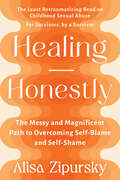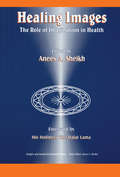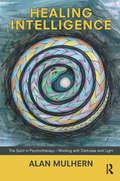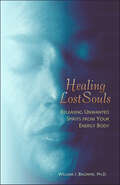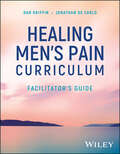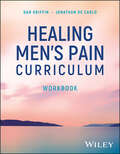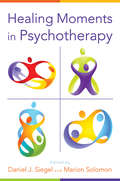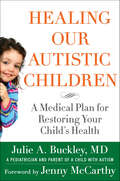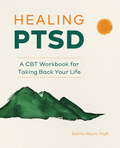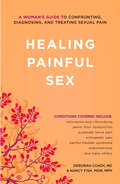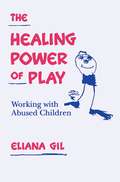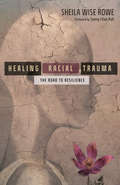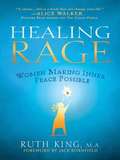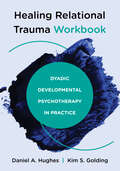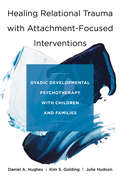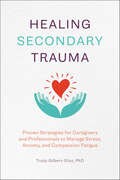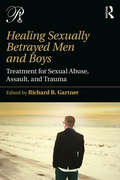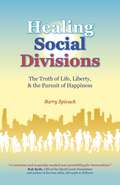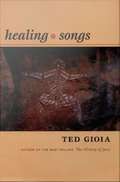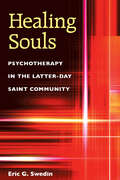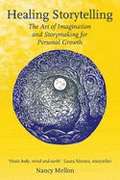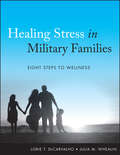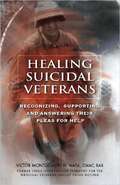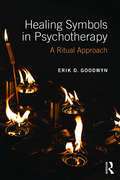- Table View
- List View
Healing Honestly: The Messy and Magnificent Path to Overcoming Self-Blame and Self-Shame
by Alisa ZipurskyThe Least Retraumatizing Read on Childhood Sexual Abuse. For Survivors, by a Survivor.Healing Honestly is a candid, poignant, and often funny survivor-to-survivor guide to navigating the salty waters of untrue stories and victim-blaming narratives that survivors of child sex abuse hear every day.Survivors of child sex abuse (CSA) are inundated with untrue stories of their abuse, the aftermath, and what their healing journey should look like. The truth is those stories are a bunch of hot garbage. Healing Honestly is a guide for survivors, written by a survivor, helping to break through the negative self-talk and debunk the myths that impact victims of CSA, such as: There is a real survivor out there, and we are not it. It happened so long ago that we should be over it by now. We are having too much sex because of our trauma, and also, we are having too little sex because of our trauma. With an approachable style that makes heavy topics not so damn scary, this book shows how trauma survivors can learn to identify these untrue stories that often come up in dating, in friendships, in families, at work, and more. Readers will discover strategies for turning down the volume on the bullshit so that they can hear their own wisdom and inner truth more clearly. Full of wit and humor, Healing Honestly offers practical strategies for survivors of sex abuse to support themselves in living full and vibrant lives.
Healing Images: The Role of Imagination in Health (Imagery and Human Development Series)
by Anees Ahmad Sheikh"Healing Images: The Role of Imagination in Health" details the function and capacity of imagination in health. This work consists of 22 chapters and discusses theory, research, and clinical applications. Presented is a brief history of the use of imagery for healing in both Eastern and Western traditions, a review of research that deals with the physiological consequences of imagery and related approaches, and an explanation of how images lead to such bodily changes. "Healing Images" covers the latest theory and research on the relationship between imagery, cerebral laterality, and healing. An attempt is also made to integrate modern systems theory with concepts of information and energy, which disclose the role of imagery and love in health. Imagery and music in health are also discussed.
Healing Intelligence: The Spirit in Psychotherapy - Working with Darkness and Light
by Alan MulhernNatural healing intelligence is one of the great mysteries of the psyche. It is inherently elusive yet lies at the core of all efforts to cure emotional wounds. Psychotherapy and counselling, when done in depth, pass beyond interpretation to work directly with this powerful force. This book is intended to help those who suffer such emotional wounds by illuminating the path of healing as well as to provide deep insight and effective methods for the practitioner.
Healing Lost Souls: Releasing Unwanted Spirits from Your Energy Body
by William J. BaldwinFor two decades, William Baldwin has been a pioneer in the ever-expanding therapeutic fields of Spirit Releasement, Past Life Regression, and Soul-Mind Fragmentation. In his Florida practice, he uses these therapies routinely to help patients who suffer from Dissociative Trance and Dissociative Identity (formerly called Multiple Personality) Disorders.Healing Lost Souls explains the attributes of each therapy in everyday language, and provides dozens of case studies to illustrate its clinical use. Likening his work to the ancient practice of shamanism, Baldwin has found that psychological disorders are often rooted in past life traumas, the interference of attached entities of various origins, and the fragmentation of one's soul. Baldwin stresses the importance of active patient participation throughout the stages of regression, as well as the need to treat encountered entities with respect, since they are often mere lost souls as bewildered and frightened as the patients themselves.
Healing Men's Pain Curriculum, Facilitator's Guide
by Dan Griffin Jonathan De CarloA 36-hour curriculum designed to help men overcome past trauma and develop the skills they need to live safe and caring lives Healing Men's Pain Curriculum helpsmale-identified participants create a vision of the men they want to be and provides them with the awareness, tools, and confidence to achieve that vision. Each of the 18 two-hour, cofacilitated sessions includes activities, exercises, and experiential opportunities enabling each participant to connect with the content on a personal level. The program is wide-ranging and encompasses a variety of topics to help participants develop increased self-awareness to enhance their relationships. Participants explore their childhood, adolescent, and adult trauma; relational struggles, particularly issues of healthy attachment; and other issues that male-identified individuals often experience. The material in Healing Men's Pain Curriculum will stretch both participants and facilitators alike. The sessions are designed to take a deep and comprehensive look at everything that blocks men from being the best men they can be. The curriculum speaks to all learning styles through the use of art, physical movement, and roleplays. Participants are given additional learning opportunities in the form of assignments to complete between sessions. These assignments build upon the roleplays and in-session practice to help participants translate the material directly into their own lives. Help men address their traumas, develop self-awareness, and build healthier relationships in recovery programs, mental health groups, or other settings Pick and choose from 18 intentionally designed lessons—or use the entire curriculum in order Access engaging activities that get participants moving and talking despite diverse learning styles and backgrounds Focus on male socialization, narrative therapy, and interactive learning to help participants develop understanding of themselves and others Written by an expert on masculinity with a Master's degree in gender studies, this curriculum is an excellent foundation or supplement to addiction programs, trauma groups, men's groups, church groups, and beyond. Designed as a compliment to Helping Men Recover.
Healing Men's Pain Curriculum, Workbook
by Dan Griffin Jonathan De CarloA 36-hour curriculum designed to help men overcome past trauma and develop the skills they need to live safe and caring lives Healing Men's Pain Curriculum helps male-identified participants create a vision of the men they want to be and provides them with the awareness, tools, and confidence to achieve that vision. Each of the 18 two-hour, cofacilitated sessions includes activities, exercises, and experiential opportunities enabling each participant to connect with the content on a personal level. The program is wide-ranging and encompasses a variety of topics to help participants develop increased self-awareness to enhance their relationships. Participants explore their childhood, adolescent, and adult trauma; relational struggles, particularly issues of healthy attachment; and other issues that male-identified individuals often experience.The material in Healing Men’s Pain Curriculum will stretch both participants and facilitators alike. The sessions are designed to take a deep and comprehensive look at everything that blocks men from being the best men they can be. The curriculum speaks to all learning styles through the use of art, physical movement, and roleplays.Participants are given additional learning opportunities in the form of assignments to complete between sessions.These assignments build upon the roleplays and in-session practice to help participants translate the material directly into their own lives. Help men address their traumas, develop self-awareness, and build healthier relationships in recovery programs, mental health groups, or other settings Pick and choose from 18 intentionally designed lessons- or use the entire curriculum in order Access engaging activities that get participants moving and talking despite diverse learning styles and backgrounds Focus on male socialization, narrative therapy, and interactive learning to help participants develop understanding of themselves and others Written by an expert on masculinity with a Master's degree in gender studies, this curriculum is an excellent foundation or supplement to addiction programs, trauma groups, men’s groups, church groups, and beyond. Designed as a compliment to Helping Men Recover.
Healing Moments in Psychotherapy (Norton Series on Interpersonal Neurobiology)
by Daniel J. Siegel Marion SolomonDistinguished clinicians explain what lies at the heart of change in effective psychotherapy. A wide range of distinguished scientists and clinicians discuss the nature of change in the therapeutic process. Jaak Panksepp, Ian McGilchrist, Ruth Lanius, Francine Shapiro, and other luminaries offer readers a powerful journey through mindful awareness, neural integration, affective neuroscience, and therapeutic presence to reveal the transformational nature of therapy. Healing Moments in Psychotherapy dives deep into the art and science of healing from the perspective of a variety of clinical approaches and scientific viewpoints, including interpersonal neurobiology. Through the voices of a dozen clinicians and scientists presenting their combined experiences and wisdom, it serves as a window into the process of healing. Practical examples and empowering research data support the ways in which therapeutic relationships can help catalyze health and restore wellness within psychotherapy.
Healing Our Autistic Children: A Medical Plan for Restoring Your Child's Health
by Julie A. Buckley“Indispensable reading . . . Dr. Buckley explains how biomedical intervention is not only helpful, but it’s a treatment that works.” —Joey Travolta, film actor & director of Normal People Scare MeEvery twenty minutes a child is diagnosed with a disease on the autism spectrum—including ADD, learning disabilities, Asperger’s, Autism, and PDD—making it today’s most common childhood disability. While the medical establishment treats autism as a psychiatric condition and prescribes behaviorally based therapies, Dr. Julie A. Buckley argues that it is a physiological disease that must be medically treated.Part personal story of her battle to heal her autistic daughter, part guide for parents, Healing Our Autistic Children explains simply and accessibly the new treatments and diets that have already proven effective for many families. Told through the case studies of her patients, the book is divided into four typical visits to Dr. Buckley’s pediatric practice so that parents can see the progression of initial treatment. Written in a warmly engaging voice, parents new to the diagnosis will:Learn about clinical treatments that workUnderstand how different foods affect the body and how to begin implementing dietsLearn to navigate the medical system and advocate for their childBridge the communication gap with their pediatricianDiscover that recovery is possible“A truly must-read book for parents and families looking for knowledge on autism spectrum disorders without going through years of medical school and countless amounts of research. Dr. Buckley puts the complicated world of autism into accessible terms.” —Tony Pashos, former Jacksonville Jaguar and active member of HEAL
Healing PTSD: A CBT Workbook for Taking Back Your Life
by Sabina Mauro PsyDTake the reins back from PTSD—evidence-based tools to help you live your best life After a traumatic event, you may find yourself surviving one day at a time, rather than feeling and functioning at your best. While recovery may seem difficult, you can change how you respond to traumatic memories and begin taking control of your life again. Healing PTSD is filled with exercises, tools, and strategies based in cognitive behavioral therapy (CBT) to help you manage your PTSD symptoms, develop healthy coping mechanisms, and thrive. Start the healing process with research-supported techniques and activities for finding calm, reframing your thoughts, being present, accepting the uncertain, and facing your fears. You'll learn how to identify your triggers, overcome challenges, recognize your own growth and resilience, and maintain your healing over the long term. Healing PTSD includes: Intro to trauma & PTSD—Gain a better understanding of the different types of trauma, how it affects the brain, and the signs and symptoms of PTSD and complex PTSD. CBT for PTSD—Learn why cognitive behavioral therapy is the gold standard for managing PTSD symptoms and improving well-being. Tools for healing—Use proven methods and strategies to help heal PTSD and live a healthier, happier life. Better understand and manage your PTSD symptoms with the practical strategies and exercises in this book.
Healing Painful Sex: A Woman's Guide to Confronting, Diagnosing, and Treating Sexual Pain
by Deborah Coady Nancy FishMillions of Women Suffer from sexual and pelvic pain in America today, yet it is frequently misdiagnosed-or not diagnosed at all. In Healing Painful Sex, Deborah Coady, MD, and Nancy Fish, MSW, MPH, use their combined professional expertise as a doctor and therapist to provide readers with an understanding of the many causes of sexual pain and how to treat it from both a physical and psychological standpoint. Book jacket.
Healing Power of Play
by Eliana GilThis book describes how therapists can both facilitate constructive play therapy and intervene in posttraumatic play to help children who have been traumatized by abuse or neglect achieve a positive resolution. Traditional techniques of play therapy are reviewed for their application to this population. Throughout, numerous therapeutic aids are described to enhance the child's capacity to communicate verbally or symbolically. To help clinicians translate theory into daily practice, the book presents six detailed clinical vignettes that offer step-by-step guidelines for assessment and intervention in different situations of abuse or neglect.
Healing Racial Trauma: The Road to Resilience
by Sheila Wise Rowe"People of color have endured traumatic histories and almost daily assaults on our dignity. We have prayed about racism, been in denial, or acted out in anger, but we have not known how to individually or collectively pursue healing from the racial trauma."
Healing Rage
by Ruth KingFew recognize the enormous power of rage as a vehicle for healing, or possess the skillful means to transform rage from a destructive to a life affirming resource. Rage is fuel, the source of our empowerment. When we embrace this brilliance respectfully, rage teaches us how to live, love, and heal. Self-help authors rarely distinguish between anger and rage, but Ruth King has devoted her career to exploring the subtle varieties of rage, while challenging the notion that rage is an "evil" emotion that must be eradicated. In Healing Rage, she gives all readers access to her pioneering, breakthrough program, which has already changed thousands of lives through workshops nationwide. Rage, King explains, sits at the crossroads of personal transformation. Those of us seeking more self-awareness will inevitably stumble upon personal rage on the path. Rage is not to be understood as a useless emotion, empty of story or knowledge, but as clarity and untapped fuel. Embraced with compassion, the energy trapped in rage becomes an intimate and empathic teacher offering balance, integrity, and inner peace to your healing journey, relationships, and service. King identifies six common disguises of rage (dominance, defiance, devotion, distraction, depression, and dependence) and provides healing exercises including: * Discover your rage inheritance and how to transform your legacy. * Learn how to Look Within before Acting Out. * Learn how to break habitual pain patterns in relationships. * Learn how to center yourself again and again in difficult situations. * Learn how to stay true to yourself when others are raging. * And learn how to stop contributing to your own suffering. Many of us go through our lives maintaining a good front. We may have all of the trappings-good job, higher education, and material gain--yet we have an inherent discontent with our lives that won't go away. Written for every woman-ranging from counselors and their patients to those who may not realize that rage is at the root of their unhappiness and have just begun to seek new paths of hope-Healing Rageis a unique invitation for transformation.
Healing Rage: Women Making Inner Peace Possible
by Ruth KingNow in paperback, the self-published success that provides guidance for women in identifying and transforming one of the most challenging emotions of our lives Self-help authors rarely distinguish between anger and rage, but Ruth King has devoted her career to exploring the subtle varieties of this emotion. In Healing Rage, she gives all readers access to her pioneering, breakthrough program, which has already changed thousands of lives through workshops nationwide. Written for every woman?from counselors and their patients to those who may not realize that rage is at the root of their unhappiness and have just begun to seek new paths of hope?Healing Rage is a unique invitation for transformation.
Healing Relational Trauma Workbook: Dyadic Developmental Psychotherapy in Practice
by Daniel A. Hughes Kim S. GoldingA resource for practitioners implementing attachment-focused treatment for young people. Dyadic Developmental Psychotherapy (DDP) is an attachment-focused treatment for children and adolescents who have experienced abuse and neglect and are now living in stable foster and adoptive families. Here, Daniel Hughes and Kim S. Golding provide a practical accompaniment to their highly successful DDP text coauthored with Julie Hudson, Healing Relational Trauma with Attachment-Focused Interventions (2019). In this workbook, practitioners are invited to reflect on their experience of implementing the DDP model through discussion, examples, and reflection prompts. Readers are encouraged to consider the diversity of both practitioners and those receiving DDP interventions, and how each unique individual’s identity can be embraced within the application of DDP interventions. DDP can be practiced as a therapy, a parenting approach, and as a practice approach for those working within healthcare, social care, or education, and this workbook is an invaluable resource for readers who fall into any one of these roles.
Healing Relational Trauma with Attachment-Focused Interventions: Dyadic Developmental Psychotherapy With Children And Families
by Daniel A. Hughes Kim S. Golding Julie HudsonFrom the founder of DDP, this updated and comprehensive guide is the authoritative text on DDP. DDP is an attachment-focused treatment for children and adolescents who experience abuse and neglect and who are now living in stable foster and adoptive families. Its central interventions are influenced by enhanced knowledge about the structure and functions of the brain, as well as the latest findings regarding developmental trauma and the related attachment problems it brings.
Healing Secondary Trauma: Proven Strategies for Caregivers and Professionals to Manage Stress, Anxiety, and Compassion Fatigue
by Trudy Gilbert-EliotTaking care of the caregivers—a compassionate guide to healing secondary traumaA traumatic experience can have profound impacts on the people directly involved. However, that trauma can extend to the professionals like first responders and crisis counselors, as well as the friends and family of trauma survivors—even if it wasn't a firsthand experience.Healing Secondary Trauma is the gentle guide to help you identify symptoms, understand the feelings, and begin the healing process of your own secondary trauma. With interactive exercises and cutting-edge strategies for caregivers and professionals, it will help you address the daily realities of compassion fatigue, stress, and anxiety. Your journey to recovery from secondary trauma starts here.Inside this book you'll learn:Find yourself again—Learn how to process and manage your emotional responses so you feel calmer, present, and more in control of yourself.Plan for wellness—Create a path toward healing with a personalized self-care plan and strategies to regenerate empathy when your compassion stores feel low.You're not alone—Stories about everyday people highlight how secondary trauma can affect all of us in different ways.Begin the healing process from your secondary trauma today.
Healing Sexually Betrayed Men and Boys: Treatment for Sexual Abuse, Assault, and Trauma (Psychoanalysis in a New Key Book Series)
by Richard B. GartnerHealing Sexually Betrayed Men and Boys: Treatment for Sexual Abuse, Assault, and Trauma is the new authoritative source for treatment of sexually victimized men and boys. Male victims and survivors of sexual trauma lived in shadow until the turn of the 21st century, when scandal after scandal about the sexual abuse of boys and men shed light on their suffering. These men and boys require different treatment roadmaps than their female counterparts. Yet there is little in the professional literature to help a clinician work with sexually traumatized boys and men. Richard B. Gartner is a seasoned psychologist/psychoanalyst who has worked therapeutically with sexually abused men for over three decades. He is a clinician, advocate, teacher, lecturer, and nationally and internationally recognized expert on the subject. Dr. Gartner’s classic book, Betrayed as Boys: Psychodynamic Treatment of Sexually Abused Men, is one of the few written to guide clinicians. Now, nearly two decades after writing that groundbreaking volume, he follows up on his earlier work. Healing Sexually Abused Men and Boys, together with its companion volume, Understanding the Sexual Betrayal of Boys and Men, is a thorough, comprehensive guide to learning about and healing male victims and survivors. Dr. Gartner has invited a group of experts to write about specific problems faced by these boys and men. Specialists from the psychoanalytic, psychodynamic, trauma, and legal worlds fill in the details about a wide range of interconnected subjects related to the complex reverberations of male sexual trauma. Healing Sexually Betrayed Men and Boys covers such diverse topics as: therapy with young sexually traumatized boys; the aftermath for men who were raped as adults ; covert seduction of boys and its aftereffects; treatment for substance addictions and sexual compulsions; couples work with male survivors and their partners or spouses; bodywork with male survivors; treatment for male veterans who suffered sexual trauma in the military; profiling sexual predators and working with survivors who have also been sexual predators. This book is a valuable resource for clinicians at every level of training. With strategies for how survivors can build support networks and descriptions of clinical, familial, and community-based treatments, Healing Sexually Betrayed Men and Boys is essential reading for clinicians of all theoretical persuasions who work with male sexual abuse survivors. Filling in gaps in the relatively scant literature on the subject, it will also help sexually abused or assaulted men themselves understand what is available to them.
Healing Social Divisions: The Truth of Life, Liberty and the Pursuit of Happiness
by Barry SpivackWe live at a time when societies are riven with division and strife. What hope is there for us to heal? Healing Social Divisions provides a radically new, non-ideological and effective consciousness- based approach for transforming our societies. Peer-reviewed research provides evidence that it is possible to neutralise stress in the collective consciousness of a society. This then promotes life, liberty, happiness, heals social divisions and creates the platform for good governance. The research challenges the conventional wisdom that consciousness is only a by-product of brain functioning. Along the route it examines our self-concept, freeing us from the biases of reductionism that impede the development of morality in our public life.
Healing Songs
by Ted GioiaWhile the first healers were musicians who relied on rhythm and song to help cure the sick, over time Western thinkers and doctors lost touch with these traditions. In the West, for almost two millennia, the roles of the healer and the musician have been strictly separated. Until recently, that is. Over the past few decades there has been a resurgence of interest in healing music. In the midst of this nascent revival, Ted Gioia, a musician, composer, and widely praised author, offers the first detailed exploration of the uses of music for curative purposes from ancient times to the present. Gioia's inquiry into the restorative powers of sound moves effortlessly from the history of shamanism to the role of Orpheus as a mythical figure linking Eastern and Western ideas about therapeutic music, and from Native American healing ceremonies to what clinical studies can reveal about the efficacy of contemporary methods of sonic healing. Gioia considers a broad range of therapies, providing a thoughtful, impartial guide to their histories and claims, their successes and failures. He examines a host of New Age practices, including toning, Cymatics, drumming circles, and the Tomatis method. And he explores how the medical establishment has begun to recognize and incorporate the therapeutic power of song. Acknowledging that the drumming circle will not--and should not--replace the emergency room, nor the shaman the cardiologist, Gioia suggests that the most promising path is one in which both the latest medical science and music--with its capacity to transform attitudes and bring people together--are brought to bear on the multifaceted healing process. In Healing Songs, as in its companion volume Work Songs, Gioia moves beyond studies of music centered on specific performers, time periods, or genres to illuminate how music enters into and transforms the experiences of everyday life.
Healing Souls: Psychotherapy in the Latter-day Saint Community
by Eric G. SwedinIn this first history of psychotherapy among the Latter-day Saints, Eric G. Swedin describes how modern psychology has affected the "healing of souls” in the LDS community. But he also shows how this community melded its theological doctrines with mainstream psychiatry when secular concepts clashed with fundamental tenets of Mormonism. The psychological professions pervasive in twentieth-century American society were viewed as dangerous by some religious communities. Healing Souls describes the LDS community's mixed feelings about science and modernity: while valuing knowledge, Mormons feared a challenge to faith. Nonetheless, psychology courses were introduced at Brigham Young University, and LDS psychotherapists began to introduce new ideas and practices to the community. Swedin portrays the rise of professional organizations such as the Association of Mormon Counselors and Psychotherapists, as well as the importance of Allen E. Bergin, first director of the BYU Institute for Studies in Values and Human Behavior. Bergin and others paved the way for the LDS adoption of professional psychotherapy as an essential element of their "cure of souls." Important chapters take up LDS psychopathology, feminist dissent, LDS philosophies of sexuality, and the LDS rejection of mainstream psychotherapy's selfist psychology on the basis of theological doctrines of family salvation, eternalism, and the natural man. Healing Souls contributes to a more complete historical picture of the mental health professions in North America and a better understanding of how religious traditions and psychology have influenced each other.
Healing Storytelling: The Art of Imagination and Storytelling for Personal Growth
by Nancy Mellon Susan PerrowIn this step-by-step guide, Nancy Mellon explores the secrets of what makes a good story and how to confidently tell stories from scratch. The healing power of stories is a strong antidote to today's world of electronic screens. Storytelling is an engaging and meaningful way to share our thoughts and feelings. As a path of self-development, storytelling awakes inner archetypal experiences, symbols, and forces for healing others and oneself. <p><p> Nancy Mellon shows how to create a magical atmosphere for storytelling, how to use movement and direction within a story, how to set a storyscape, beginnings and endings, and the best way to use the rhythms of voice and language. Here, too, are the subtler ingredients of storytelling, including moods, the elements, seasons, and the symbolism of magical words, objects, and weapons that represent the external and archetypal forces in our world.
Healing Stress in Military Families
by Lorie T. Decarvalho Julia M. WhealinEight practical steps to help military families through the unique issues they face When service members return, it's up to their families to try to soften their re-entry into civilian life. Healing Stress in Military Families offers practical help for military families coping with the myriad repercussions of their loved ones' duties, from their deployment to their return home. Based on the latest scientific research and best practice guidelines-as well as the authors' experience treating veterans and their families-Healing Stress in Military Families offers answers for the stress that comes not only from war, but also from other related issues, including deployment and redeployment, relocation, and reunion. Healing Stress in Military Families provides: Evidence-based advice for clinicians helping military families with adjustment problems by facilitating communication, reconnection, and growth "Making It Real" exercises for clinicians to employ with families in sessions "Talking Points" that explore how to guide the family in their healing process Homework handouts and between-session "Taking Action" exercises for families that reinforce and build on skills and information introduced in sessions Compassionately written with the military family at heart, Healing Stress in Military Families provides the information, tools, and skills that will empower these courageous families to more easily heal and become stronger and more resilient as they go through life. "This practical workbook will help others understand the highly complex factors that cause dysfunction within military families. Using a clear format that avoids jargon, providers and families can work through the eight practical steps that focus on reconnecting the family and improving resiliency. This excellent book will surely become core material for anyone interested in working with military families. " -Bradford Felker, MD, Director, Mental Health Primary Care Service, VA Puget Sound Health Care System and Associate Professor, Department of Psychiatry, University of Washington School of Medicine "Healing Stress in Military Families: Eight Steps to Wellness is a timely, practical publication that recognizes and addresses the impact of traumatic stress on countless 'hidden victims,' our military families. The focus on empowerment and goal-directedness-versus illness, disorder and dysfunction-is so needed today. " -Mark D. Lerner, PhD, President, American Academy of Experts in Traumatic Stress
Healing Suicidal Veterans: Recognizing, Supporting and Answering Their Pleas for Help
by Victor Montgomery III<p>Veterans are suffering a "mental breakdown" epidemic, often linked to post traumatic stress from the terrors of combat, traumatic brain injury, and drug and alcohol abuse. The problems triggered by an excessive number of deployments, financial and family trouble, fragmented or nonexistent support systems, and increased domestic stress have caused a mass depression among vets. <p><i>Healing Suicidal Veterans</i> takes readers firsthand into the "situation room" where crisis intervention and addiction therapist Victor Montgomery explores the psychological wounds of war and the ways they contribute to the tragedy of suicidal veterans. He presents the Montgomery Model for ending veterans' suffering and anguish and putting them on solid paths to healing. The book offers veterans strategies for realizing they are not failures if they seek aid, and it gives families and loved ones ways to understand, cope with, and help their veteran in need.
Healing Symbols in Psychotherapy: A Ritual Approach
by Erik D. GoodwynRitual scholars note that rituals have powerful psychological, social and even biological effects, but these findings have not yet been integrated into the practice of psychotherapy and psychiatry. In Healing Symbols in Psychotherapy Erik D. Goodwyn attempts to rectify this by reviewing the most pertinent work done in the area of ritual study and applying it to the practice of psychotherapy and psychiatry, providing a new framework with which to approach therapy. The book combines ritual study with depth psychology, placebo study, biogenetic structuralism and cognitive anthropology to create a model of interdisciplinary psychology. Goodwyn uses examples of rituals from history, folklore and cross-cultural study and uncovers the universal themes embedded within them as well as their psychological functions. As ritual scholars show time and again how Western culture and medicine is ‘ritually impoverished’ the application of ritual themes to therapy yields many new avenues for healing. The interdisciplinary model used here suggests new ways to approach problems with basic identity, complicated grief, anxiety, depression meaninglessness and a host of other problems encountered in clinical work. The interdisciplinary approach of this accessibly-written book will appeal to psychotherapists, psychiatrists and Jungian analysts as well as those in training and readers with an interest in the science behind ritual.
